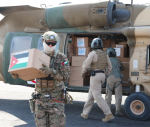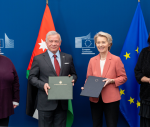You are here
New life amid the ruins of Mosul’s maternity hospital
By Reuters - Aug 17,2017 - Last updated at Aug 17,2017

A displaced Iraqi boy, who fled the fighting in the region of Mosul, gestures to the camera at the Debaga camp, east of Makhmur in northern Iraq, on Thursday (AFP photo)
MOSUL — As yet unnamed twin babies lie in an incubator in a run-down room in Mosul's main maternity hospital. Less than two weeks old, they are two of seven newborns crammed into a makeshift premature baby ward.
Born just three weeks after Iraqi forces declared that they had finally recaptured the last part of the city from the Daesh terror group, the twins will not know what it is like to grow up under the extremists’ draconian rule. But they are lucky in more ways than one — had they been born months earlier, their chances of survival would have been slim as the hospital's neo-natal wings had been burned down by the militants.
Al Khansa Hospital in East Mosul may be a shell of its former self but it is still the city's main government-run maternity facility. Last month alone, despite severe shortages of medicines and equipment, it delivered nearly 1,400 babies.
When Daesh took over Mosul in 2014, the hospital stayed open — but residents were only allowed to use a quarter of it.
"We had all these fighters and their wives coming in and giving birth here," said hospital administrator Dr Aziz, adding that he had lost count of the number of militants' babies delivered in his facility. "Mosul's local residents always came second."
As Iraqi forces began their campaign to liberate the city from Daesh control last year, the militants took over Al Khansa, kicking out patients and sometimes shooting at staff to make them leave.
"We kept it open as long as we could," Aziz said.
Daesh turned the hospital into a warehouse to store medical supplies — mainly glucose injections and cough syrup. As their defeat looked imminent, they started fires and detonated explosives throughout the hospital.
"They knew exactly what to blow up and how to do the most damage," Aziz said, walking through the charred remains of the operating theatres.
Shortages of everything
Al Khansa reopened just weeks after East Mosul was cleared of militants in January. But its needs are still dire.
"We have shortages of everything," said the hospital's director, Dr Jamal Younis. "Beds, equipment, medicines."
At present, the hospital can only handle births and deaths, Younis said. For anything in between, patients have to travel to facilities miles away — an impossible expense for most.
In a hot and crowded room, Um Mohammad sat with her grandson, only a few months old and barely able to move. She said she had been waiting there for 15 days, trying to find $25 to pay for blood tests.
She has been living in a camp since an air strike flattened her house in West Mosul, killing her daughter and five of her grandchildren.
"I can't take him back to the camp without treatment or a diagnosis," she said, "but I don't have the money."
Al Khansa has yet to receive funds for reconstruction from the health ministry. Instead it had been relying on NGOs and donations from residents and staff — most of whom have not been paid for more than two years, since Baghdad cut salaries to choke off funding to Daesh.
"When the city was under Daesh control, we were forced to come into work every day or they would punish us — seize our houses, beat us, threaten our families," said Aziz.
"But now, even though we're still unpaid and the walls have fallen down, we're happy to come in every day to help our community."
Related Articles
QAYYARAH, Iraq — The babies cry with hunger but are so severely malnourished that doctors treating them at a hospital in Iraq would make the
MOSUL, Iraq — Amid the bombed-out ruins of an ancient site revered by both Muslims and Christians in Mosul, Iraqi violinist Ameen Mukdad on
RAFAH, Palestinian Territories — Under a ceaseless storm of strikes in Gaza, a baby girl has survived insurmountable odds as the only member



















